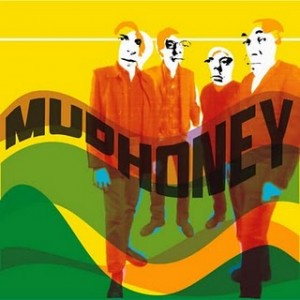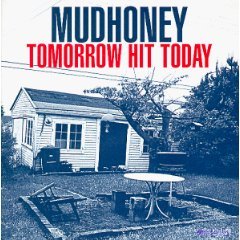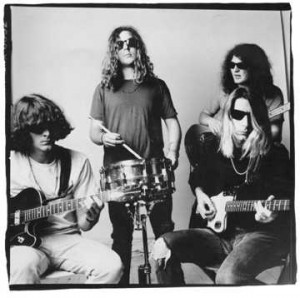FOREWORD: Mudhoney’s Mark Arm and Steve Turner joined me for dinner in Little Italy during ’98 when they were touring for Tomorrow Hit Today. It was still daylight and they were going on at 10 PM at Bowery Ballroom. We shared thoughts, talked about the Seattle grunge scene, and laughed off some beers. The Bowery was packed that night. And Mudhoney played as hard and raw as they possibly could. In ’02, they released Since We’ve Become Translucent and I got to speak to Mark via the phone. This article originally appeared in Aquarian Weekly. Below the Aquarian article is my initial ’98 interview caught on tape in Little Italy for my friend Jeff Wright’s art mag, Cover.
Alongside more experimental counterparts the Melvins, Washington natives Mudhoney lit the fuse igniting the Nineties grunge explosion. Originally, vocalist-guitarist Mark Arm and guitarist Steve Turner had teamed up with future Pearl Jam members Jeff Ament and Stone Gossard as Green River for the blistering Rehab Doll, forging the carnal post-punk exploits of the Butthole Surfers with the forthcoming metal-edged grunge of Soundgarden, Tad, and Alice In Chains. But when ‘87s impromptu single, “Touch Me I’m Sick,” and ‘89s developmental eponymous full-length debut received college radio exposure, Mudhoney built their own fervent cult following.
’91s shambolic Every Good Boy Deserves Fudge… turned out to be the volatile mess o’ fun the quartet (filled out by bassist Matt Luikin and drummer Dan Peters) had longed for, leading to ‘93s maddening blitzkrieg Piece Of Cake. The aggressive buzz-toned sonics of “Suck You Dry” led to the succulent 7-song neo-psychedelic departure, Five Dollar Bob’s Mock Cooter Stew.
Throughout, Arm’s smoke-charred baritone pelted smug lyrics in an uncontrollable manner, unleashing infuriated caterwauls and churning bellows for utmost ferocity. By ‘95s cataclysmic My Brother The Cow, Mudhoney began to strike a balance between feasible hard rock accessibility and visceral sludginess, indicting the status-seeking Courtney Love on the malevolent fuck-off, “Into The Shtik.”
It became apparent Mudhoney was getting better with each successive release despite fading farther from fan-fraught fame. ‘98s feral Tomorrow Hit Today left a permanent shit-stained mark on post-grunge graduates. The organ-doused garage rocker “Night Of The Hunted” stated its purpose clearly, to “stand our ground” and against all odds never “back down.”
 Despite its self-effacing title, Since We’ve Become Translucent didn’t surface until ’02. But any apprehensions the combo might have had are negated by this fresh set of taut song ideas. Punctual horns perk up and enliven the bombastic Exile On Main Street-informed “Where The Flavor Is” and the skull-drilling “Take It Like A Man.” A hazy Black Sabbath darkness hovers above “Crooked And Wide,” as new bassist Guy Maddison (ex-Lubricated Goat) pours on apropos gloom. “Sonic Infusion” crosses stoner rock idealism with Raw Power suss and the rampaging “Dyin’ For It” gets propelled by droning keyboard madness.
Despite its self-effacing title, Since We’ve Become Translucent didn’t surface until ’02. But any apprehensions the combo might have had are negated by this fresh set of taut song ideas. Punctual horns perk up and enliven the bombastic Exile On Main Street-informed “Where The Flavor Is” and the skull-drilling “Take It Like A Man.” A hazy Black Sabbath darkness hovers above “Crooked And Wide,” as new bassist Guy Maddison (ex-Lubricated Goat) pours on apropos gloom. “Sonic Infusion” crosses stoner rock idealism with Raw Power suss and the rampaging “Dyin’ For It” gets propelled by droning keyboard madness.
Meanwhile, cavernous cobwebs of cacophonous guitar affects climax in a sea of wailin’ tenor sax (courtesy of Arm’s long-time buddy, Craig Flori) on the long mantra, “Baby Can You Dig The Light,” creating a fertile jam only grunge masters the Melvins could match. The rambunctious “Inside Job” features legendary MC5 bassist Wayne Kramer and the downcast “In The Winner’s Circle” spits out blood-curdling vitriol like Alice Cooper once did.
During free time, Arm has toiled with gut-busting garage-Blues alongside members of Lubricated Goat in Bloodloss while Turner played R & B-damaged proto-punk in the Fall-Outs. Together, they continue to make side projects under the Monkeywrench moniker.
Do you really feel Mudhoney has done a disappearing act as per the facetiously sarcastic LP title?
MARK ARM: We’re a little fuzzier. (ha-ha) It’s from a line in “Sonic Confusion.”
In the late ‘80s, the Pixies, Melvins, and Mudhoney perked up an underground scene battling back stale hair-metal bands.
I appreciate that anyone would think our little contribution to the world of music perked up the scene.
I own an old Green River record that further solidifies your historic stature.
That began in ’84 when the Butthole Surfers and Big Black ruled. What was good about that time was bands were doing stuff they wanted to do with no goal in mind to attract a certain crowd. The Butthole Surfers were completely in their own little world in all aspects of personality and music. They didn’t worry about breaking on radio. Our motivation has only been to please ourselves and if people came along for the ride, great.
Were you friends with fellow Northwest rock hopefuls the Melvins prior to the grunge explosion?
Matt (Lukin) was in the Melvins. We played early shows with them until they moved to San Francisco. There was acrimony between Matt and the Melvins because of what transpired. (ed. note: he was left behind in Seattle) We did play with them in L.A. around ’89 with Thee Headcoats. Our paths cross periodically, but not as much as they should have, considering our shared history. We’re hoping to play with them in Portland this fall.
You got to work with former MC5 idol Wayne Kramer on “Inside Job.” How’d that come about?
There was a short-lived internet site, Music Blitz.com, we got approached by in ’99. It was gonna be a web-only site before Napster went hog wild. They were trying to sell downloads, but were undercut by free file sharing. Before we went to the studio, he came over to my house and played some bass ‘cause Matt had quit. They asked Wayne to put together a compilation called Beyond Cyberpunk with mostly older punk dudes like Pere Ubu and younger, upcoming bands.
I’m due to interview Pere Ubu soon.
Tom Herman, who just re-joined the band, is one of my favorite guitar players. What I love about Pere Ubu is they existed in a place where there was no support system prior to punk. Some of it sounds like a cross between Stooges, Hawkwind, and Captain Beefheart. That’s three of my favorite bands of all time.
Your new songs seem more approachable thanks to the spanking horn sections and punctual arrangements.
We’re getting more aware of how to do things, I hope.
Why use three separate producers at three different studios for this album?
Except for Tomorrow Hit Today, when we used Jim Dickinson (Rolling Stones, Big Star, Replacements), we never really had a set producer. We always worked with engineers to co-produce. The idea was to add more tonal sonic variety.
How has new bassist Guy Maddison affected Mudhoney’s sound?
He used to play in Bloodloss with me and was in Lubricated Goat. He’s lived in Seattle since ’93. He has a totally different style than Matt. He doesn’t follow along with the guitar riff. He plays around it and has a great fluid style. If it weren’t for him, we wouldn’t have been able to go on. His personality fits in.
Do you listen to mod bluesrock revivalists White Stripes?
I saw them a few weeks ago.
What’d you think of Kelly Osbourne’s cute punk-pop version of Madonna’s “Papa Don’t Preach”?
It’s kind of like Frank and Moon Unit Zappa’s novelty, “Valley Girl.”
————————————————————————————-
 MUDHONEY LOOK FORWARD ON ‘TOMORROW HIT TODAY’
MUDHONEY LOOK FORWARD ON ‘TOMORROW HIT TODAY’
Though incorrectly introduced as straight-edge by a mutual friend in 1983, Mudhoney founders Mark Arm and Steve Turner came from distinctly different Northwest backgrounds. As one of the forefathers of Seattle’s grunge scene, Mudhoney began sharpening their skills with the psychedelicized Superfuzz Bigmuff EP. Since ’93, they’ve recorded for major label, Reprise, delivering virtually ignored masterpiece, My Brother The Cow, and ‘98s wholly diversified Tomorrow Hit Today.
As we await dinner at Mulberry Street’s Da Nico before Mudhoney’s superb Bowery Ballroom set, Arm offers, “My parents were so against rock and roll, which made it intriguing. My mom was an opera singer and hated any non-Classical music. She had strict ideas of what was right and wrong since she grew up under Hitler in Germany and now is in her seventies. I gave my dad a Hank Williams record for Christmas and she mocked it for being boring  and repetitive. But my dad was from Kansas and used to listen to that growing up.”
and repetitive. But my dad was from Kansas and used to listen to that growing up.”
Dragged to opera shows, church, and Christian schools as a pre-teen, Arm developed a rebellious attitude reflected in the ambivalent, sometimes venomous lyrics Mudhoney’s songs receive. Although Arm’s diatribes probe morbid fascinations with uneasy queasiness and explore the unsettled dementia of life’s dark underside, he rejects the tortured artist treatment.
“Most artists write about good times and love. It’s done to death. So I might as well be the guy who focuses on the bad times,” he says.
As Arm’s partner, Turner grew up in a family of overachievers, but he was more interested in riding bikes and skateboarding.
“When I was 14, my mom thought I was a genius, so since then I could do no wrong,” Turner admits.
While Arm appears to be a menacingly unkempt rascal with red-dyed hair and bad attitude, the opposite seems true of Turner, who wears small, conservative specs, fits the mold of Mr. Perfect, and runs Superelectro Records (which features indie bands the Fall-Outs, Kent 3, and Wellwater Conspiracy).
“We had friends running the Amphetamine Reptile and Sub Pop labels when we first got together. We planned to put out one single. I was working at Muzak in the shipping department at the time,” explains Turner.
As grunge gained national popularity, Mudhoney became a fixture on the touring circuit, never gaining the massive acceptance afforded Nirvana, Soundgarden, and Stone Temple Pilots.
While enjoying delicious Italian food, Arm offered some scattered thoughts on egomaniacal legends from Seattle’s early ‘90s heyday.
“Some local artists swallowed fame hook, line, and sinker, surrounding themselves with leeches. We’ve seen a lot of people thrust into the spotlight and very few did it with grace. Pearl Jam never threw stupid tantrums and never asked ‘do you know who I am?’ They know that bowing down to people like that is ridiculous. And it’s an ongoing condition.”
Two hours later at Bowery Ballroom, Mudhoney blows its avid fans away with the meaty hooks and propulsive beat of new songs like buzzing spaghetti western-influenced “Oblivion,” snarled garage rockin’ “Night Of The Hunter,” and whiny-voiced “A Thousand Forms Of Mind.” As Arm’s groaning blues-soaked voice purged burning staements of purpose and Turner’s icy riffs soared into the dope-filled room, it was apparent that Mudhoney’s wicked enthusiasm hadn’t wavered a bit in more than a decade.